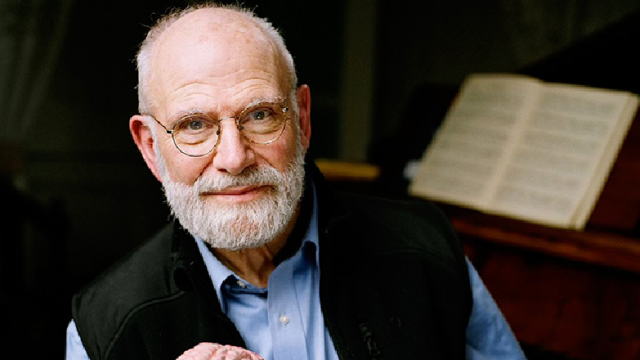Neurologist and writer Oliver Sacks passed away today at the age of 82. Sacks is best known for his writing, which brought neurological case studies to life for a general audience.
In what he called “neurological novels”, he took readers inside the experiences of people recovering from encephalitis or living with Tourette’s, amnesia, visual agnosia (in which people can’t recognise the objects they see), autism and other neurological conditions. The stories in his books had been gathered from his years of neurological practice.
“I would like it to be thought that I had listened carefully to what patients and others have told me, that I’ve tried to imagine what it was like for them, and that I tried to convey this,” he said in a 1989 interview on “The MacNeil/Lehrer NewsHour.”
His best-selling books include Awakenings (1973), The Man Who Mistook His Wife for a Hat and Other Clinical Tales (1985), An Anthropologist on Mars: Seven Paradoxical Tales(1995), and Musicophilia: Tales of Music and the Brain (2007). He completed his memoir, On the Move: A Life in Dec. 2014, just before receiving his diagnosis of terminal cancer.
Sacks discussed the diagnosis candidly in a Feb. 19 New York Times opinion piece titled “My Own Life.”
“It is up to me now to choose how to live out the months that remain to me. I have to live in the richest, deepest, most productive way I can,” he wrote. “I feel a sudden clear focus and perspective. There is no time for anything inessential. I must focus on myself, my work and my friends. I shall no longer look at ‘NewsHour’ every night. I shall no longer pay any attention to politics or arguments about global warming.”
Those things, Sacks felt, were up to future generations, and he expressed optimism about their prospects. “I rejoice when I meet gifted young people — even the one who biopsied and diagnosed my metastases. I feel the future is in good hands,” he wrote.
Life and Career
Oliver Sacks was the youngest child of two doctors, the physician Samuel Sacks and the surgeon Muriel Elise Landau. Both his parents were the children of poor Jewish immigrants; Samuel Sacks’ family came to London from Lithuania, and Muriel Elise Landau’s father was a shoemaker and inventor who came to London from Russia. As a child, he helped his mother with dissections at home.
Sacks lived with a form of prosopagnosia, a perceptual disorder that keeps him from recognising faces. “I have had difficulty recognising faces for as long as I can remember,” he wrote in a 2010 piece for The New Yorker.
He studied medicine at Oxford University, and then moved to California in 1961, where he completed a residency at Mt. Zion Hospital in San Francisco and fellowships in neurology and psychiatry at UCLA. During his time in Los Angeles, he befriended the poet Thom Gunn, entered weight-lifting competitions on Los Angeles’ Muscle Beach, occasionally rode with the Hells Angels, and experimented heavily with recreational drugs, which he wrote about in his 2012 book Hallucinations.
Sacks moved to New York in 1965 to accept a position as a professor of clinical neurology at the Albert Einstein College of Medicine, where he worked until 2007. In 1992, he also accepted a position at the New York University School of Medicine. He left the Albert Einstein College of Medicine and New York University in 2007 for a position as a professor of neurology and psychiatry at Columbia Univerity, but he returned to New York University in 2012. Throughout this time, Sacks also served as a consulting neurologist at the Bronx Psychiatric Center and for several New York nursing homes. He also maintained a neurology practice for most of his career.
He published his first book, Awakenings, about his experiences with recovering encephalitis patients, in 1973, and went on to write a dozen other books. The most recent, his memoir On the Move: A Life, gave readers a personal look at Sacks’ childhood, his time in California, and his coming out as gay. In his February New York Times piece, Sacks said that he had several other books nearly finished.
Sacks was appointed a Commander of the Order of the British Empire in 2008, and he held honorary doctorates from several institutions, as well as the position of “Columbia Artist” at Columbia University, which was created especially to honour Sacks’ contributions to the arts and sciences. He also founded the Oliver Sacks Foundation, “a nonprofit organisation devoted to increasing understanding of the human brain and mind through the power of narrative nonfiction and case histories.”
Sacks passed away in his Manhattan home. He is survived by writer Bill Hayes, his partner of eight years. In February, he wrote, “I cannot pretend I am without fear. But my predominant feeling is one of gratitude. I have loved and been loved; I have been given much and I have given something in return; I have read and travelled and thought and written. I have had an intercourse with the world, the special intercourse of writers and readers.
“Above all, I have been a sentient being, a thinking animal, on this beautiful planet, and that in itself has been an enormous privilege and adventure.”
Picture: Oliver Sacks
